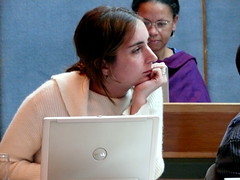Use Foxmarks to Improve Productivity!
A little time organizing the bookmarks in your web browser is a great productivity booster, and ...
With time you grow so accustomed to your own unique placement of links that working on another machine destroys your rhythm. It could be as disorienting as working with an unfamiliar browser or waking up in a strange room.
If you feel the same way and use Firefox (why don't you, btw?), then you absolutely must try Foxmarks.
I've been using it to keep my office, home and laptop in perfect sync. It hasn't crashed the browser, lost my bookmarks or drawn attention to itself in any other way. (But do back up your bookmarks, because not everyone has been equally lucky.)
Here are the easy steps:
- Log in to your primary machine, the one you use the most and on which you know your way around.
- Spend a little time to neaten up and organize the bookmarks.
- Back up your bookmarks. (Learn how to backup the bookmarks here.)
- Download and install Foxmarks Bookmark Synchronizer
- Restart the browser. There would be a prompt to do so. (If you are doing something else in another tab or window, finish the work first.)
- Open an account on the Foxcloud Server. (Don't worry, this part happens automatically. You only need to choose a username and password.)
- Follow the prompts and your bookmarks would be copied to the Foxcloud server. Nothing else visibly changes.
On any machines that you need to synchronize now, follow essentially the same process, except the bit about opening a new account on Foxcloud. Instead, supply the original username and password. Foxmarks would merge any bookmarks on the new machine with those saved on the server and copy everything to the browser. Adjust as necessary and forget all about it.
You'd see the same set of bookmarks, identically placed on both (all of) your machines. Any changes you make at one place would appear at other places, before you notice the difference.
Now get productive!
 New Delhi: Want to take the ultimate pilgrimage to God? Pay the middleman as the Haj is up for sale. Just as many temple establishments across India are often accused of exploiting poor Hindus, so also are poor, vulnerable Muslims who are being exploited for their beliefs.
New Delhi: Want to take the ultimate pilgrimage to God? Pay the middleman as the Haj is up for sale. Just as many temple establishments across India are often accused of exploiting poor Hindus, so also are poor, vulnerable Muslims who are being exploited for their beliefs.


 This morning the
This morning the  New Delhi: The Ulta Pul was a casualty waiting to happen. The foot overbridge that smashed down on top of a moving train on Saturday morning was a British relic - over 140 years old and beyond repair. Coach No. F-8 of the Howrah-Jamalpur Superfast Express was crushed under the weight of the Ulta Pul, which was being demolished - a new one having been constructed and already in use to replace it. Though all the passengers trapped inside the coach were rescued and taken to a district hospital, 33 of them succumbed to their injuries.
New Delhi: The Ulta Pul was a casualty waiting to happen. The foot overbridge that smashed down on top of a moving train on Saturday morning was a British relic - over 140 years old and beyond repair. Coach No. F-8 of the Howrah-Jamalpur Superfast Express was crushed under the weight of the Ulta Pul, which was being demolished - a new one having been constructed and already in use to replace it. Though all the passengers trapped inside the coach were rescued and taken to a district hospital, 33 of them succumbed to their injuries.